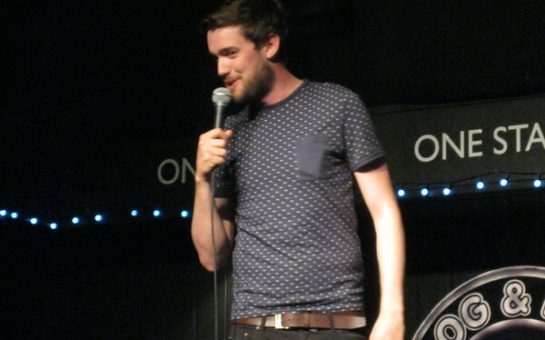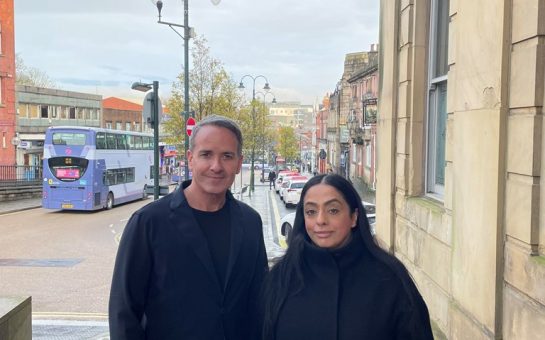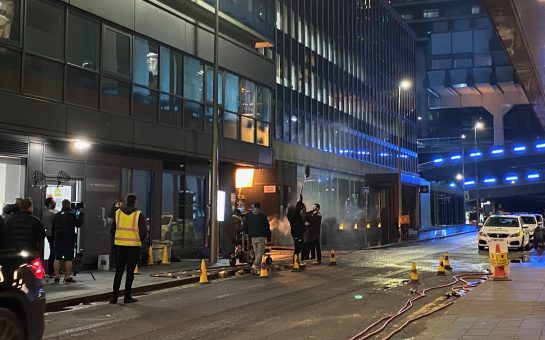Lockdown has impacted all corners of the entertainment sector to a devastating degree, and comedy is no exception. In fact, stand-up is arguably more reliant on a live audience than any other performance art.
New technology – like the ‘front row’ function on Zoom, allowing around 30 people to unmute and talk to or heckle comedians – has evolved over the past year to make events more interactive.
This has helped big clubs like Manchester’s Frog and Bucket and The Stand’s venues to stream successful online shows as a way to keep afloat during restrictions.
But how have comedians – more accustomed to working a room than a webcam – adapted to the lack of in-person gigs? And will the demand for live comedy return after the pandemic, or have our heads been turned by more convenient digital formats?
Pro comic Matt Reed has worked hard to build his career on the North East circuit for 22 years, and fondly recalls the time he slept on a bench in Birmingham to make sure he could do a gig at The Glee.
“Now I do stand-up full time as my job,” said Matt. “I couldn’t possibly survive without it. I didn’t realise how important it was for my mental and physical health. Lockdown has been absolutely horrible.”
Matt has only managed to do a few in-person gigs over the past year, but he has started doing more online shows, appearing regularly in Felt Nowt, a collective run by North East comedians to guarantee work for performers in the region.
“Felt Nowt has managed to maintain the careers of North East comedians so they won’t be coming back to the clubs rusty,” said Matt.
“Also, the industry isn’t really paying attention to our region, so it’s nice to see a gang saying ‘we can do this ourselves’. It’s all very punk rock and I like it.”
Matt struggled doing online shows initially as he said it felt like talking into a void, but he finds it much easier now with Zoom’s virtual front row function: “You can work with the crowd and go off the energy in the audience. I love doing that. Also you can see into people’s houses so it gives you something else to take the mick out of.”
Semi-pro Anja Atkinson was working two jobs while trying to build her stand-up career, which was starting to take-off just as lockdown hit.
She allowed herself a few weeks of self-pity after her booking to headline Red Raw at The Stand in Newcastle was cancelled: “I felt like all the momentum I’d built up was going to dissipate.
“I put all the success I’d had down to luck; like I’d been wandering into green rooms and getting on stage by accident. I thought there was no way that luck was going to come back.”
But, like Matt, Anja has been adapting to online platforms, although it hasn’t been easy. Describing her experience pre-recording an online set, sometimes required for larger live stream shows, she said:
“I knew there was this big audience of thousands that I couldn’t control and I couldn’t perceive how they were watching the show.
“So I got drunk in my parent’s living room while they were in bed, trying to record these rude jokes without them hearing.
“I was whispering my set into my phone and drinking gin, thinking I have literally no idea if this is funny. It was way more nerve-wracking than an auditorium full of people.”
Stevie Martin, London-based writer and comedian, was also terrified by the idea of doing online stand-up, despite being a seasoned live performer.
Over lockdown she decided to focus on creating online sketches, which have boosted her now sizeable followings of 62.2k on Twitter and 17.2k on Instagram.
Longing for a more interactive format, Stevie began making a semi-live sketch show called The Book Club on the streaming platform Twitch, in which she and a guest discuss an invented book each week.
It allowed her to do something more exciting and ‘in the moment’ than pre-recorded sketches, while still avoiding the awkwardness of online stand-up.
Initially used mainly for e-gaming, Twitch was commandeered during the pandemic by comedians like Bilal Zafar, who created comedy characters and commentated on live e-sports games from the corner of the screen.
Although Stevie has enjoyed experimenting with new formats for her material, and appreciates the extra followers this has generated, she does not believe online comedy will tempt audiences away from live stand-up:
“I think we’re going to fall back in love with the live stuff. When you’re in the room and someone’s smashing it, it’s just magical. There’s a real kind of electricity you can’t replicate online. I’ve watched a lot of online shows and they’ve got me through – but it’s no substitute.
“People aren’t ever going to stop watching funny clips online, but I will be interested to see whether my views go down when things open back up again.”
Some comedians who have adapted their material for online channels are also finding ways to monetise their content.
Membership platform Patreon allows content creators to run a subscription service, and with a few hundred loyal fans comedians can maintain a steady income.
Tik Tok’s new Creator Fund pays a fluctuating amount to content creators who receive at least 100K authentic video views in the previous 30 days.
Still, many comedians are using online content only to bolster their live careers after lockdown finishes.
Freddy Quinne, North West pro with 10 years on the club circuit, has been posting videos on Tik Tok, but opted not to monetise his content. He is focusing instead on growing a potential audience for his live shows after lockdown, which he can’t wait to get back to.
He now has 225.9K followers and his videos get between 2.5 and 5 million views per week; more than many TV programmes. One of his recent videos even made national news: “Man’s mind blown by post office realisation that took him 32 years to figure out”, The Mirror reported.
“Ten years ago the golden rule was – don’t put your material online,” said Freddy. “People will see your joke and it will ruin it for your live show.
“I think it took something like Covid to see that people are happy consuming comedy in different ways, and comedians with other projects like podcasts and videos have fared better over lockdown.
“Before Covid I had no interest in anything other than live stand-up. But now I do see the value in online stuff. You can do what you want as long as there is an audience for it – it’s very freeing.”
Online platforms may have been a welcomed raft for tech savvy pro-comics, but what about those trying to break onto the scene?
Amateur stand-ups Mike Linwood and Elise Lawrance formed part of a comedy quartet called Carload of Comics in Hull in early 2020, but only managed to do a few live shows before restrictions hit.
Neither is interested in doing online comedy without getting more live experience under their belts. For Elise, whose sheer love of the stage inspired her to try stand-up, it is only a live atmosphere she craves:
“Laughing is a group thing – you join in laughing and you don’t know why. You just need to hit that joke and it ripples. One little joke and the whole room fizzes. You can’t get that online.”
Mike is confident that the demand for live comedy will return, but is concerned about opportunities to perform when things open up: “It’s the smaller venues, the rooms above pubs – how many have come through this? Will there be enough gigs for people to do this as their job?”
For other beginners, however, online shows have been a leveller, offering a relatively secure platform for them to try out comedy without having to brave the clubs.
Chris Wright, a full time dad in Glasgow, was inspired to keep his mind busy over lockdown by writing comedy.
He joined the Facebook group Displaced Comedians – a forum with 6.9k members, set-up to help comedians find work “in the changing landscape of Covid era comedy” – where he found opportunities to write for and then appear on American YouTube comedy shows like The Broadway Comedy Club’s live stream.
Despite being completely new to comedy, Chris has been getting paid for his material and performances quite consistently, which he says has been “weird but great”.
“Online shows have been a godsend for me,” he said.
“I think live comedy will definitely bounce back, but I also think there will be a place for the live stuff, especially things like workshops. That was really a gateway for me to start-off from a place of relative security.”
But even Chris, who has found great success in online comedy, finds himself yearning for the stage: “I feel like I can’t call myself a comedian until I cut my teeth on a live show.”
Chris hopes the confidence he has gained doing online shows over the past year will propel him to try an open mic night in Glasgow when the clubs open – although he thinks he will miss being able to do his set remotely.
He said: “Doing it from my house means I can cry as soon as I close my laptop after a bad set, rather than having to make it all the way home from a gig.”



